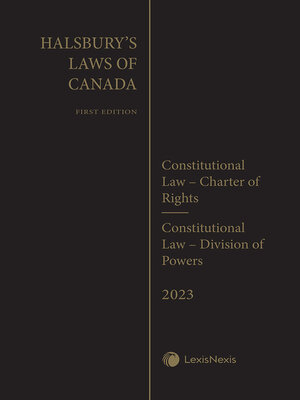Halsbury's Laws of Canada -- Constitutional Law -- Charter of Rights (2023 Reissue) / Constitutional Law -- Division of Powers (2023 Reissue)
ebook ∣ Volume 1
By Dwight Newman

Sign up to save your library
With an OverDrive account, you can save your favorite libraries for at-a-glance information about availability. Find out more about OverDrive accounts.
Find this title in Libby, the library reading app by OverDrive.



Search for a digital library with this title
Title found at these libraries:
| Loading... |
CONSTITUTIONAL LAW – CHARTER OF RIGHTS
Dwight Newman, K.C., B.A., M.A.T.S., J.D., M.Sc., B.C.L., M.Phil., D.Phil.
The impact of the Canadian Charter of Rights and Freedoms on virtually every field of law is beyond debate, as is the importance of an authoritative resource that lawyers can turn to for a clear explanation of its application and interpretation.
Constitutional Law – Charter of Rights discusses the scope and application of the Charter, and its interpretation by Canadian courts.
Topics covered include:
CONSTITUTIONAL LAW – DIVISION OF POWERS
Guy Régimbald, B.S.Sc., LL.B., B.C.L. (Oxon.) & John J. Wilson, B.A (Hons.), J.D., B.C.L.
Canada's constitution creates two distinct levels of legislative authority. It is therefore of critical importance to know which subject areas are within the exclusive jurisdiction of Parliament, which are strictly matters for the provincial legislatures, and which are areas of both federal and provincial jurisdiction.
Constitutional Law – Division of Powers illuminates the complex interaction between the written and unwritten elements of the constitution, together with the common law and practices, customs and conventions that have shaped our modern legal system.
Topics covered include:






